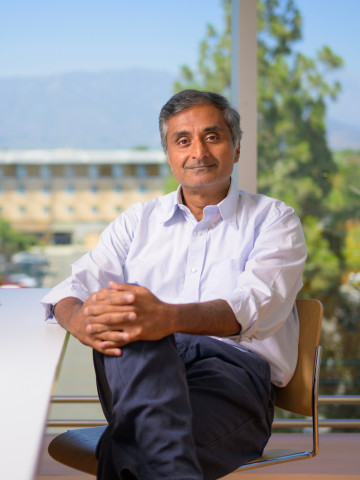
Shibu Yooseph, Ph.D.
Kravis Professor of Integrated Sciences: Computational Biology and Bioinformatics
Department
Kravis Department of Integrated Sciences
Areas of Expertise
Biotechnology
Computational Biology
Computer Science
Human Genome
Theoretical Computer Science
Biography
Previous Appointments:
- University of Central Florida (2016-2023)
- Professor in the Department of Computer Science
- Cluster Lead for the Genomics and Bioinformatics Cluster
- Secondary Joint Appointment in the Burnett School of Biomedical Sciences
- Human Longevity Inc. (2014-2016)
- Senior Director of Bioinformatics / Microbiome Lead
- J. Craig Venter Institute (2003-2016)
- Professor of Informatics (2014-2016)
- Director of Informatics, San Diego (2009-2011)
- Associate Professor of Informatics (2009-2013)
- Senior Computational Scientist (2003-2008)
- Celera Genomics (2000-2003)
- Computer Scientist
- University of Southern California (1998-2000)
- Research Associate
- Center for Discrete Mathematics and Theoretical Computer Science (DIMACS), Rutgers University (1997-1998)
- Postdoctoral Fellow
- Lucent Technologies, Bell Labs (1997-1998)
- Consultant
Education
Ph.D. in Computer and Information Science (1997)
University of Pennsylvania, Philadelphia, Pennsylvania
Thesis: Phylogeny Construction and Consensus Methods
Thesis advisor: Professor Tandy Warnow
Bachelor of Technology in Computer Science and Engineering (1992)
Indian Institute of Technology, Banaras Hindu University, Varanasi (India)
Research and Publications
Research Areas:
- Algorithm design and combinatorial optimization
- Machine Learning
- Computational Biology, Genomics, and Bioinformatics
- Metagenomics
- Sequence Assembly
- Homology Detection
- Phylogenetics
- Biomarker Discovery
- Clustering and Ordination
- Functional Genomics
- Microbiome Research
- Integration and analysis of microbiome ‘-omics’ data
- Microbial diversity and ecology in different environments including air, water, and human
- Prediction of microbial associations/interactions
- Host-microbiome associations and mechanisms in the context of health and disease
Research contributions to several genome projects:
- Human Genome Project
- Mouse Genome Project
- Sorcerer II Global Ocean Sampling Project
- Human Microbiome Project
Google Scholar link to publications.
